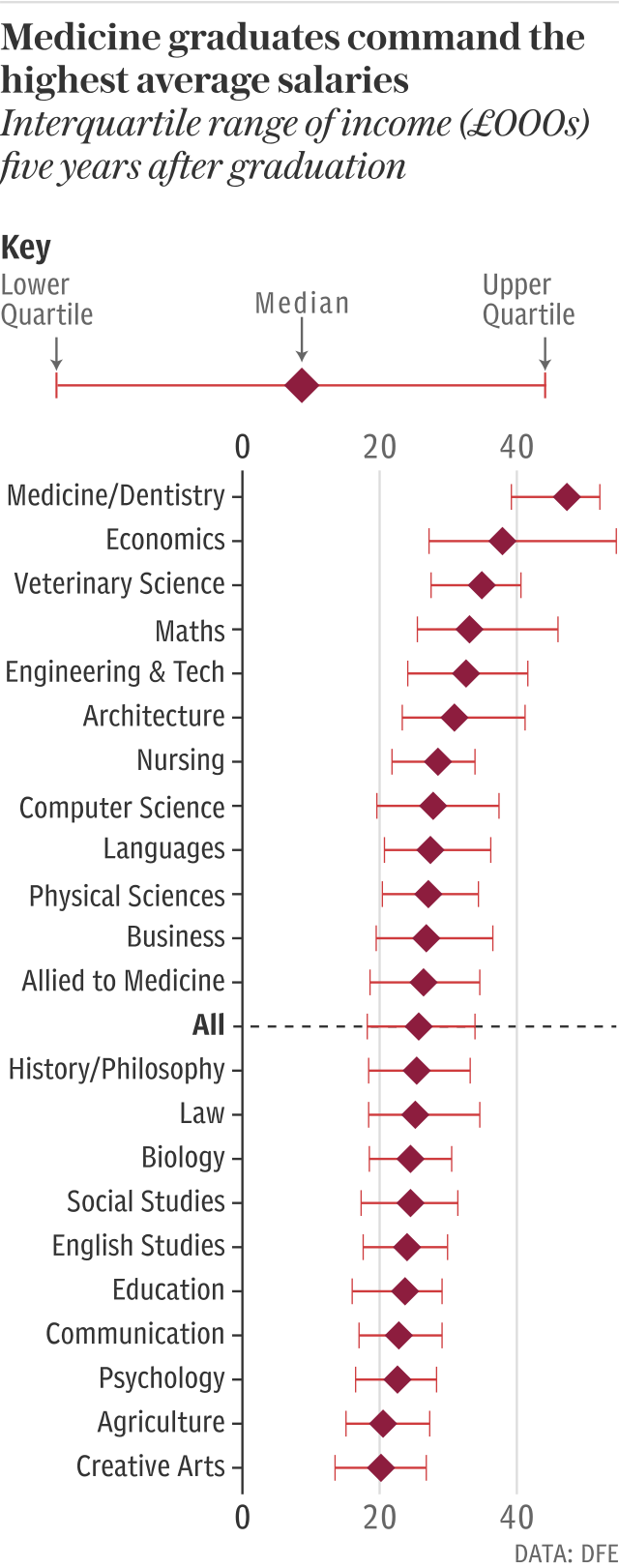Britain's highest paying degrees, according to graduate salary

Asked which degree you should take for the highest graduate salary, you may well think of Oxbridge excellence in law or economics.
With the Oxbridge deadline, as well as that for courses in medicine, veterinary science and dentistry, approaching on 15 October, such courses might be tempting to make the most money in later life.
It is certainly true that some courses at top universities can give you some of the highest paying degrees, adding tens of thousands to the average starting salary.
But some of the highest paying jobs actually come from some lesser known institutions, with engineering, computer science and business graduates from a wide variety of universities punching above their weight.
While earnings aren't everything, it's important to know that a course is worth paying thousands of pounds a year for.
Use the tool below to compare which courses delivered the highest earnings five years after graduating. It contains a couple of entries that are likely to be fairly surprising.

The highest paying university degrees
Oxbridge and Russell Group courses are reliably found at the top of the rankings after five years in the jobs market.
Those who studied economics at Cambridge University could expect to earn £68,600, while graduates of Oxford University's business and administrative studies earned £67,200.
Economics degrees at the University Of St Andrews and the London School Of Economics And Political Science were almost as lucrative, with the median salary of the 2009/10 academic cohort standing at over £60,000 in 2015/16.

When we only consider larger courses with over 50 students, however, universities such as the London School of Economics and Political Science and the Imperial College of Science, Technology and Medicine perform well.
LSE’s economics degree delivered a median salary of £61,100 after five years, while a 2009/10 student of Imperial’s computer science degree could expect to earn £60,000 in 2015/16.

What about the highest graduate salary after one year?
While looking at highest paying jobs a year after graduation is not the ideal way of measuring the true earnings of a specific course or institution, we can still glean an indication of a course’s potential.
The most lucrative course is surprising when we look at figures this way. All the big name universities are beaten by a little known institution from east London.
According to figures from the Department for Education, engineering and technology students from Havering College of Further and Higher Education command a higher average salary than graduates of any other course in Britain a year after graduating.
The small course only had 10 students in 2014-15, but this cohort achieved a median salary of £43,200 in 2015-16.
This is more than £3,000 ahead of Imperial College London's computer science graduates in second place.

Medicine graduates tend to get jobs that pay well
Medicine has been revealed as the degree subject attracting the highest average graduate salary, according to the figures.
While some economics and business courses might bring in the most money individually, the average medicine graduate was earning £46,600 five years after completing their course - the highest of any subject.
The statistics, which are drawn from PAYE and declared self-employment earnings data, show that the overall average is £25,700 across all subjects for those graduating in 2009-10.
At the other end of the spectrum people graduating with creative arts degrees had the lowest average salaries, standing at just £20,200 five years after graduation.
Such figures are being released by the Department of Education as the Government ramps up efforts to allow people to compare the value of studying different university courses.

How big an impact does a specific course actually make on earnings?
When looking at graduate salaries it is important to note that many things go into determining the earnings potential of a graduate.
Oxford and Cambridge come at the top end of the table for graduate salaries but a large part of this is due to the fact that they select some of the best students to take their courses. The true extent to which the university has boosted their earning potential is therefore not immediately apparent.
Earlier this year the IFS (the Institute For Fiscal Studies) sought to answer this conundrum by measuring earnings after accounting for things like prior attainment, socioeconomic background, region and ethnicity.
After doing this they concluded that studying at the most prestigious universities did, in fact, result in higher earnings. LSE had the greatest effect and was responsible for a 49 per cent boost in wages for men and 37 per cent for women compared to the average graduate.

 Yahoo News
Yahoo News 
